Michael Swanwick's Blog, page 17
June 19, 2024
One-Day E-Book Sales! Three Days Only!
.
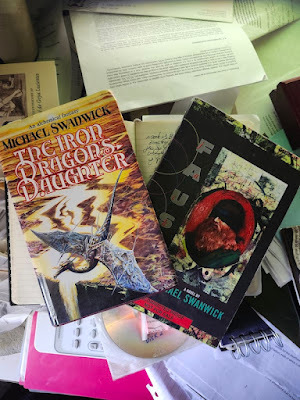
As happens from time to time, I've been notified by Open Road Media, who publish several of my e-books, that they're putting one of my books up for sale, one day only. Sometimes I learn of more than one sale in the space of a couple of days.
So I'm pleased to let you know that there will be three one-day sales this month.
The first is for Jack Faust, which will be available for $1.99 ( US only) on this Friday, June 21st.
The second is for (again) Jack Faust, which will be available for $1.99 ( US only) on the following Friday, June 28th.
The third is for The Iron Dragon's Daughter, which will be available for $1.99 (in Canada and the US only) on Sunday, June 30th.
So if you enjoy e-books and like getting them cheap... And if you're curious about two of my best novels... Well, here's your chance to consider buying one or two.
There. You won't get a softer sales pitch than that.
Above: I grabbed two of the books with the covers I like best and photographed them atop my desk. Marianne Porter, my wife, says that you have only so much organization in your life. No matter how much effort you invest in trying, you can't increase that amount--you can only decide where it goes. A great deal of organization goes into my work. Not so much into my workspace.
*
A Taste of The War With the Zylv
.
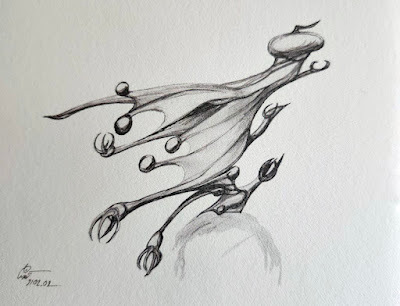
This Saturday at noon, Marianne Porter puts Dragonstairs Press's latest chapbook, The War With the Zylv on sale. That's at noon, East Coast Time. The chapbook is signed, numbered, lovingly stitched, and available for $11 within the US and $13 elsewhere, postage included.
The story was inspired by Ariel Cinii's artwork reproduced above and used by permission of the artist's estate.
And just so you can have an idea of what the story is like, here's the first of six chapters:
FirstContact
They camein peace.
The Zylvship—sprawling, sinister, and elegant—entered the Solar System on a tight,sun-grazing vector, exiting and re-entering repeatedly over the next twentyyears, dumping velocity with every passage. All the while radiating attemptsacross the electromagnetic spectrum to communicate with whomever might beliving here: One plus one equals two. Two times two is four. The square of thehypotenuse. Pi. The Fibonacci sequence. Quadratic equations. Chaos theory. Aform of combinatorics no one could make any sense of.
Earthresponded as best we could. Once the conversation moved beyond mathematics, itbecame obvious how different the Zylv were from Terran lifeforms. Slowly,painfully, a common pidgin was created. Neither species learned much about theother. But by the time the Zylv ship—dark, gothic, and miles-long—had settledinto a parking orbit around the Moon, it was hoped that with physical contact,it would be possible to move beyond COME VISIT. ALL LEARN.
I was ajunior assistant nobody on the first embassy mission to the Zylv ship. Theinterior was humid and murkily lit, which made sense because we knew alreadythat the Zylv came from a planet orbiting a red sun. The air smelled like across between turpentine and the reptile house in the zoo. At the far end of animprobably large space were creatures—the Zylv, we assumed, though our tokenbiologists thought they were six different species—that moved listlessly, like somany barnyard animals, and did not approach us.
There wasalso a large screen. On it, a word: WELCOME. Our spokesperson began a carefullycomposed speech in pidgin.
The firstword was replaced by a second: BREATHE. As if we had a choice.
Then twomore: NOW LEAVE.
Thescreen went dead. A partition rose to separate us from the beings that might ormight not be our hosts. Though we stayed far longer than made any sense, therewas no further attempt to communicate on the part of the Zylv.
Eventually,because there was no alternative, we went back home to Earth.
Quarantinewas supposed to be a formality. But then one of us came down sick. Followedquickly by the rest. A virus, moon-suited biologists told us. Of alien origin.
BREATHEthe Zylv had commanded.
And, likefools, we’d obeyed.
*
@font-face {font-family:"Cambria Math"; panose-1:2 4 5 3 5 4 6 3 2 4; mso-font-charset:0; mso-generic-font-family:roman; mso-font-pitch:variable; mso-font-signature:-536870145 1107305727 0 0 415 0;}@font-face {font-family:"Adobe Caslon Pro"; panose-1:2 5 5 2 5 5 10 2 4 3; mso-font-charset:77; mso-generic-font-family:roman; mso-font-format:other; mso-font-pitch:variable; mso-font-signature:7 1 0 0 147 0;}p.MsoNormal, li.MsoNormal, div.MsoNormal {mso-style-unhide:no; mso-style-qformat:yes; mso-style-parent:""; margin:0in; mso-pagination:none; mso-layout-grid-align:none; text-autospace:none; font-size:12.0pt; font-family:"Times New Roman",serif; mso-fareast-font-family:"Times New Roman";}.MsoChpDefault {mso-style-type:export-only; mso-default-props:yes; font-family:"Calibri",sans-serif; mso-ascii-font-family:Calibri; mso-ascii-theme-font:minor-latin; mso-fareast-font-family:Calibri; mso-fareast-theme-font:minor-latin; mso-hansi-font-family:Calibri; mso-hansi-theme-font:minor-latin; mso-bidi-font-family:"Times New Roman"; mso-bidi-theme-font:minor-bidi;}div.WordSection1 {page:WordSection1;}
June 18, 2024
Ariel Cinii's Chapbook
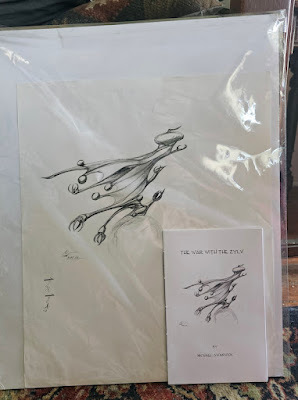
TheWar with the Zylv, Marianne Porter's latest DragonstairsPress chapbook, goes on sale this Saturday at noon, Philadelphia time, and since it is printed in an edition of 100 (numbered, signed, and hand-stitched) chapbooks, could take hours to sell out.
The story itself is a science fiction tale of first contact, invasion, and war with an alien species. It was inspired by a piece of artwork by Ariel Cinii, which is reproduced on its cover.
But who was Ariel Cinii?
Goodquestion. Ms. Cinii, who also used the names Abra Cinii, Sodyera,and Winterbrucke, but was known to her friends as Abby, was an activemember of science fiction fandom as a filk singer-songwriter, artist,and all-around fan. She was also the first openly trans individual infandom.
If I ever met her, it was one of those myriad acquaintances where you chat amiably on occasion and after a couple of years realize that it's too late to politely ask for a name without giving offense. But at Boskone, a month short of three years after her death,her friends had a table at which they were cheerily giving away herart to whoever wanted it. How could they possibly bring themselves todo this? Well... it turns out that she left behind some 1,300 worksof art. Giving it to the community she loved seemed to them the bestway they could keep her memory alive.
Theseare, yes, fan art in their themes—spaceships, aliens, futuristiccars, fantastic cities, and the like. But the skill and care thatwent into the art and its preservation indicate a high seriousness onMs. Cinii's part. Which combined with elaborate symbols with whichshe labeled her pictures in her invented language Sartine, puts herin a nebulous space somewhere between “fan art” and “high art.”Let's just call it art.
Ipicked up three 17” x 14” images and over the following monthswould look at them and think about what stories they might tell. Whenone came to me that I felt would make a good story, I pitched it toMarianne. She agreed that it would be an appropriate way to pay backMs. Cinii (and her friends) for the artwork.
And,you may ask, did we . . . ?
Yes,of course. Marianne and I paid Ariel Cinii's estate for the use of herartwork.
Thisis a motto and a matter of honor in our household: The Artist Always GetPaid. I've known artists to break out in laughter when I saythat. But we're sticking to it. Because it's how one shows respectfor the artist.
Thiswas the other way we paid back Ms. Cinii for her work.
*
June 9, 2024
On Strike Against God--And In Print Again!
.
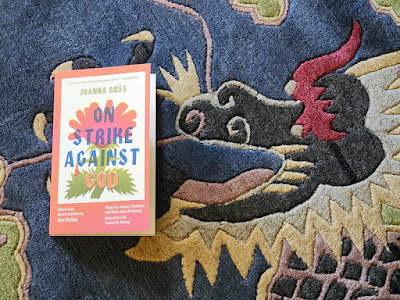
Look what came in the mail! Joanna Russ's brilliant On Strike Against God is back in print again. This is reason to rejoice.
Most of Joanna's fans aren't aware of this book because it's not science fiction. It's a highly figurative mainstream feminist lesbian novel which was written immediately after The Female Man and because it's a highly figurative feminist lesbian novel, none of the major publishers would touch it. Despite the fact that Samuel R. Delany thinks that it's Joanna's best novel
Why? Well, I could gush about the prose, the writing, the brilliance, but instead I'll just quote a brief but typical passage. Esther, the protagonist is enduring a difficult but typical date when the man in question leans forward and says:
"You're strange creatures, you women intellectuals. Tell me: What's it like to be a woman?"
I took my rifle from behind my chair and shot him. "It's like that," I said. No, of course I didn't.
Now either you find that simultaneously horrific and laugh-out-loud funny or you don't. If you don't, well... Horseman, pass by. But if you do, I can assure you that On Strike Against God is a joy and a delight.
You can pre-order it from The Feminist Press here. This volume includes several essays about the book, correspondence with Marilyn Hacker, an interview with Samuel R. Delany, and two essays on related matters by Joana herself. Joanna was a brilliant essayist. Her non-fiction crackled with ideas. If you doubt me, go to Interlibrary Loan and request a copy of How to Suppress Women's Writing. You won't regret it.
*
May 28, 2024
I Thought This Was A Good Story --Then I Learned It Was A Heroic Story
.
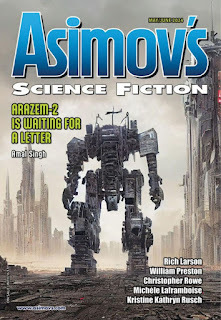
Do you have an unread copy of the May/June issue of Asimov's on hand? Quick! Right now! Open it to page 76 and read Rattler by Leonid Kaganov. The translator's note by Alex Shvartsman at the end too.
Rattler starts with a fresh take on the alien invasion story. The invader is small and so alien as to be incomprehensible. And, at first, there is only one. But it has a singular power: If anyone tries to kill it, that person immediately dies, followed by whoever ordered that person to try and that person's superior and so on up the line. So it can't be defeated and yet it must be defeated. Classic science fiction problem story.
Opposing this is a TV news team: reporter, producer, cameraman, and (the narrator) driver. They are not exactly a team of heroes. But--and the logic of this perfect--when you need heroes but can't get them, cowards will do.
It's a satisfying story. But it's the translator's note (Shvartsman, btw, does an excellent job of translation) that reveals the story to be something else... an act of heroism.
And why won't I tell you about the translator's note . . . ?
I worry that Kaganov has made himself an enemy of Putin's government. There's nothing you and I can do about that. But we can give him the one thing every writer craves: an audience. If you have a copy of this issue, read it. If you don't, buy one. If you can't buy one, go to whatever place you know of where readers gather and ask for somebody to explain it to you.
Share this post. Pass it off as your own, if you wish. Write your own review. Tell your friends to write reviews. Make this story known. Make its author famous.
He's already a hero.
*
May 27, 2024
Remembering Hetty Jones on Memorial Day
.

There are two memorial services in Roxborough on Memorial Day. The big one is at Gorgas Park by the war monument, and it'll have a good-sized turnout. But Marianne and I like to go to the earlier one, only a few blocks distant, at Leverington Cemetery. There, the number of vets actively participating in the ceremony is roughly equal to the number of civilians, family mostly, attending.
The thing about Leverington Cemetery is that it contains the graves of Americans who served in all the major wars this country has fought. The bodies of soldiers who died in the Civil War were shipped home from other states. But the eighteen Revolutionary War soldiers buried there died only a short walk away when Hessian troopers set fire to the barn they had been sheltering in and shot them as they tried to escape.
So, between that and the fact that the vets at the service are neighbors who deserve what little support we can offer, that's the service we go to.
And in what has become a small tradition in our family, Marianne cut roses from our back yard and left them on the graves of two who were never American soldiers: One was Choban Hoxha, known locally as Pretzel Pete, who had spent time in a Nazi concentration camp before being taken for slave labor by the camp's Soviet liberators, but managed to escape and make his way to America.
The other was Hetty Jones.
Miss Jones was the daughter of a prominent Baptist minister and had a comfortable life when the Civil War broke out. She did volunteer work on behalf of the Northern soldiers. But when her brother, a Union officer, died in action, she decided she was not doing enough, and volunteered as a nurse, first at Filbert Street United States Army General Hospital in Philadelphia, and then at Ulysses S. Grant's headquarters in Virginia, where the suffering was greater. Her service, it is recorded, was tireless. In 1864, she worked hard preparing Thanksgiving dinner for the soldiers there, and shortly thereafter came down with one of those diseases endemic to military hospitals at that time. She recovered enough to resume partial duties, but it did not last. She died, aged 56.
At Hetty Jones' funeral, her casket was carried by convalescing soldiers who knew her from the Filbert Street Hospital.She is buried beside the graves of her father and brother.
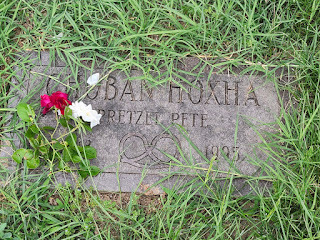
@font-face {font-family:"Cambria Math"; panose-1:2 4 5 3 5 4 6 3 2 4; mso-font-charset:0; mso-generic-font-family:roman; mso-font-pitch:variable; mso-font-signature:-536870145 1107305727 0 0 415 0;}@font-face {font-family:Calibri; panose-1:2 15 5 2 2 2 4 3 2 4; mso-font-charset:0; mso-generic-font-family:swiss; mso-font-pitch:variable; mso-font-signature:-536859905 -1073732485 9 0 511 0;}p.MsoNormal, li.MsoNormal, div.MsoNormal {mso-style-unhide:no; mso-style-qformat:yes; mso-style-parent:""; margin:0in; mso-pagination:widow-orphan; font-size:12.0pt; font-family:"Calibri",sans-serif; mso-ascii-font-family:Calibri; mso-ascii-theme-font:minor-latin; mso-fareast-font-family:Calibri; mso-fareast-theme-font:minor-latin; mso-hansi-font-family:Calibri; mso-hansi-theme-font:minor-latin; mso-bidi-font-family:"Times New Roman"; mso-bidi-theme-font:minor-bidi; mso-font-kerning:1.0pt; mso-ligatures:standardcontextual;}.MsoChpDefault {mso-style-type:export-only; mso-default-props:yes; font-family:"Calibri",sans-serif; mso-ascii-font-family:Calibri; mso-ascii-theme-font:minor-latin; mso-fareast-font-family:Calibri; mso-fareast-theme-font:minor-latin; mso-hansi-font-family:Calibri; mso-hansi-theme-font:minor-latin; mso-bidi-font-family:"Times New Roman"; mso-bidi-theme-font:minor-bidi;}div.WordSection1 {page:WordSection1;}
May 22, 2024
The Sleep of Reason is in My Hands at Last!
.
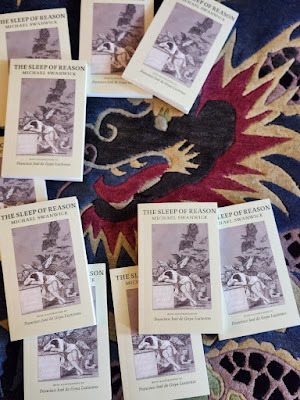
Look what came in the mail!
The Sleep of Reason is my collaboration with Francisco de Goya, one original story by myself for each of the 80 etchings of his Los Caprichos. Here's the book's back copy, describing it:
At last, Goya’s immortal etchings get the fictive treatment they deserve! Grotesque, mordant, and darkly hilarious by turn, the satiric images of Los Caprichos are as relevant now as they were when they were first published in 1799. In an era of war and extreme cruelty very much like our own, they laid bare the folly and absurdity of the human condition. As do the stories Michael Swanwick has crafted to accompany them. It is a monstrous and possibly even blasphemous work of hubris for a contemporary writer to collaborate with an artist recognized as “the last of the Old Masters and the first of the moderns” two centuries after his death rendered him unable to give his consent to the project. But Swanwick is up to the task. Read this book and discover for yourself the satirical worlds of Goya and Swanwick.
To this I must add that John D. Berry did a beautiful job designing the book. If you held it in your hand and opened it randomly, you'd want to own it, even before reading a single word. The reproduction of Goya's etchings is fine and lucid and the prose is laid out in an open and inviting manner that as good as begs you to sit down in an easy chair and start reading.
And what of the stories . . . ?
You may well ask. "Grotesque, mordant, and darkly hilarious by turn," describes these stories well. I wouldn't advise you to binge read them. But I am immodest enough to admit that I'm proud of the stories and the prose they're written in.
I honestly think you should buy a copy.
The paperback edition, published at a perfectly reasonable £12.99 can be ordered directly from PS Publishing here. The hardcover edition, published at a scandalously affordable £25.00 in an edition of 100, predictably sold out before publication.
*
May 15, 2024
a random thought
.
"Eastof the Sun and West of the Moon is what the mysterious wanderer infairy tales identifies as his place of origin. That place is, ofcourse, the Earth. But if you think about it just a little, east ofthe Sun and West of the Moon places us in a halfway place between Dayand Night.
Whichis to say, in twilight.
InEnglish folklore and literature, that space is claimed only by theIrish--in the so-called "Celtic Twilight."
Celtictwilight very rapidly became a derogatory term meaning twee, overlysentimental, and mystical in a middle-class drawing room manner. Thisis much the same scorn with which--I was there, I rememberit--fantasy was exiled to the nursery.
Butstop and reflect. Where are we humans in acosmological sense? Somewhere in the universe. On the outermost armof the Milky Way. Within shouting distance of a few local stars.
Eastof the Sun. West of the Moon.
Makingour half-lit way through the dreams of the Emerald Isle.
But,of course, I being Irish would say that. Now, wouldn't I?
My Collection is a Locus Award Finalist!
.
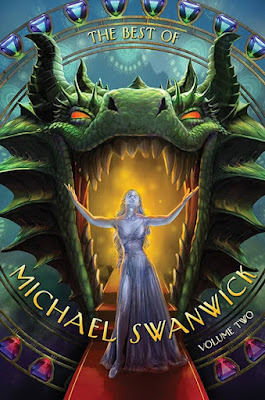
The Best of Michael Swanwick Volume Two is a finalist for the Locus Awards in the Best Collection category! This is an honor worth celebrating and I'm doing so now because there's not much chance my book will win. I say that without any self-pity whatsoever. Or modesty, come to think of it. But in the forty-nine years the category has been in existence, "Best Of" collections have only won three times--for The Best of Connie Willis, The Best of Gene Wolfe, and The Best of Fritz Leiber.
But there I am, on the slate! As are nine others:
TheEssential Peter S. Beagle, Volumes 1 & 2, Peter S. Beagle (Tachyon)
Zen and theArt of Starship Maintenance and Other Stories, Tobias S. Buckell (Apex)
The WishingPool and Other Stories, Tananarive Due (Akashic)
White Cat,Black Dog, Kelly Link (Random House; Ad Astra)
No One WillCome Back For Us, Premee Mohamed (Undertow)
Jackal,Jackal, Tobi Ogundiran (Undertow)
Skin Thief,Suzan Palumbo (Neon Hemlock)
Lost Places,Sarah Pinsker (Small Beer)
The Best ofCatherynne M. Valente, Volume One, Catherynne M. Valente (Subterranean)
@font-face {font-family:"Cambria Math"; panose-1:2 4 5 3 5 4 6 3 2 4; mso-font-charset:0; mso-generic-font-family:roman; mso-font-pitch:variable; mso-font-signature:-536870145 1107305727 0 0 415 0;}@font-face {font-family:Calibri; panose-1:2 15 5 2 2 2 4 3 2 4; mso-font-charset:0; mso-generic-font-family:swiss; mso-font-pitch:variable; mso-font-signature:-536859905 -1073732485 9 0 511 0;}p.MsoNormal, li.MsoNormal, div.MsoNormal {mso-style-unhide:no; mso-style-qformat:yes; mso-style-parent:""; margin:0in; mso-pagination:widow-orphan; font-size:12.0pt; font-family:"Calibri",sans-serif; mso-ascii-font-family:Calibri; mso-ascii-theme-font:minor-latin; mso-fareast-font-family:Calibri; mso-fareast-theme-font:minor-latin; mso-hansi-font-family:Calibri; mso-hansi-theme-font:minor-latin; mso-bidi-font-family:"Times New Roman"; mso-bidi-theme-font:minor-bidi; mso-font-kerning:1.0pt; mso-ligatures:standardcontextual;}.MsoChpDefault {mso-style-type:export-only; mso-default-props:yes; font-family:"Calibri",sans-serif; mso-ascii-font-family:Calibri; mso-ascii-theme-font:minor-latin; mso-fareast-font-family:Calibri; mso-fareast-theme-font:minor-latin; mso-hansi-font-family:Calibri; mso-hansi-theme-font:minor-latin; mso-bidi-font-family:"Times New Roman"; mso-bidi-theme-font:minor-bidi;}div.WordSection1 {page:WordSection1;}
I think you'll agree that's pretty good company to be in.
And elsewhere on the list:

In related news, Alvaro Zinos-Amaro's remarkable book length interview Being Michael Swanwick is a finalist in the Best Non-Fiction category. In case you missed it, this is a series of interviews covering pretty much every work of short fiction I've ever published--where they came from, what I was trying to do with them, seasoned with a dollop of gossip. Alvaro was an extremely insightful interviewer and a most impressive researcher. He definitely deserves an award for this book, although--as one favorable reviewer noted--people who read my short fiction are a niche market.
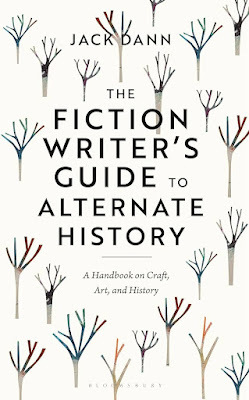
And up in the same category is The Fiction Writer's Guide to Alternate History by Jack Dann. This is relevant to me because in addition to the more analytical chapters about the nature of alternate history fiction, Jack assembled a round table of writers who have practiced the form, one of whom was me. He then posed questions, stood back, and let us disagree loudly with each other.
I will admit that, reading this book, there were a couple of times when I wished I had been more profound. But the other authors included were Kim: Kim Stanley Robinson, William Gibson, Pamela Sargent, Harry Turtledove, John Crowley, Michael Bishop, Lisa Goldstein, John Kessel, John Birmingham, Barry N. Malzberg, Janeen Webb, Bruce Sterling, Mark Shirrefs, Christopher Priest, Terry Bisson, Mary Rosenblum, Paul Di Filippo, Richard Harland, Howard Waldrop, Lewis Shiner, and George Zebrowski, so there a lot of things there worth hearing.
There are also eight other books nominated in this category, most of which I have not (alas) read. They are:
42: The Wildly Improbable Ideas ofDouglas Adams, Kevin Jon Davies, ed. (Unbound UK)
Wish I Was Here: An Anti-Memoir,M. John Harrison (Serpent’s Tail; Saga 2024)
All These Worlds, NiallHarrison (Briardene)
101 Horror Books to Read BeforeYou’re Murdered, Sadie Hartmann (Page Street Publishing)
Space Crone, Ursula K. LeGuin (Silver)
Ex Marginalia: Essays on WritingSpeculative Fiction by Persons of Color, Chinelo Onwualu, ed. (HydraHouse)
A Traveller in Time: The CriticalPractice of Maureen Kincaid Speller, Maureen Kincaid Speller (LunaPress Publishing)
Owning the Unknown: A Science FictionWriter Explores Atheism, Agnosticism, and the Idea of God, RobertCharles Wilson (Pitchstone)
@font-face {font-family:"Cambria Math"; panose-1:2 4 5 3 5 4 6 3 2 4; mso-font-charset:0; mso-generic-font-family:roman; mso-font-pitch:variable; mso-font-signature:-536870145 1107305727 0 0 415 0;}@font-face {font-family:Calibri; panose-1:2 15 5 2 2 2 4 3 2 4; mso-font-charset:0; mso-generic-font-family:swiss; mso-font-pitch:variable; mso-font-signature:-536859905 -1073732485 9 0 511 0;}@font-face {font-family:inherit; panose-1:2 11 6 4 2 2 2 2 2 4; mso-font-alt:Cambria; mso-font-charset:0; mso-generic-font-family:roman; mso-font-pitch:auto; mso-font-signature:0 0 0 0 0 0;}p.MsoNormal, li.MsoNormal, div.MsoNormal {mso-style-unhide:no; mso-style-qformat:yes; mso-style-parent:""; margin:0in; mso-pagination:widow-orphan; font-size:12.0pt; font-family:"Calibri",sans-serif; mso-ascii-font-family:Calibri; mso-ascii-theme-font:minor-latin; mso-fareast-font-family:Calibri; mso-fareast-theme-font:minor-latin; mso-hansi-font-family:Calibri; mso-hansi-theme-font:minor-latin; mso-bidi-font-family:"Times New Roman"; mso-bidi-theme-font:minor-bidi; mso-font-kerning:1.0pt; mso-ligatures:standardcontextual;}.MsoChpDefault {mso-style-type:export-only; mso-default-props:yes; font-family:"Calibri",sans-serif; mso-ascii-font-family:Calibri; mso-ascii-theme-font:minor-latin; mso-fareast-font-family:Calibri; mso-fareast-theme-font:minor-latin; mso-hansi-font-family:Calibri; mso-hansi-theme-font:minor-latin; mso-bidi-font-family:"Times New Roman"; mso-bidi-theme-font:minor-bidi;}div.WordSection1 {page:WordSection1;}
And who do I think will win . . . ?
I honestly have no idea. Perhaps because in my first decade as a published writer, my work was nominated for major awards over and over and never once won, I've always taken pleasure in the horse-race aspects of these awards. I'd read all the fiction and make my predictions, sometimes based on what deserved to win and other times based on the literary politics going on at that moment. And I was always wrong. Always.
I concluded then that there are so many factors at play in a popularly-voted award that when it comes down to the voting it goes chaotic. Which is why the process is still so much fun to watch.
Meanwhile, if you'd like to buy one of the books discussed here, you may:
The Best of Michael Swanwick Volume 2 may be purchased from Subterranean Press here.
Being Michael Swanwick is currently on sale (three dollars off!) at Fairwood Press here.
And The Fiction Writer's Guide to Alternate History is available from Bloomsbury Publishing here. Although non-UK readers might try a local bookseller to save on postage.
*
May 13, 2024
Random Readings: William Morris' "The Hollow Land"
.
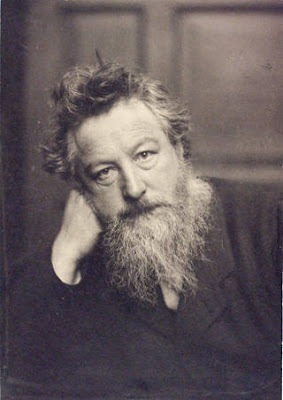
I was reading William Morris' short romance, "The Hollow Land," yesterday. It was an early work and not one he thought worth reprinting, though it happened posthumously. A fantasy, but not a great one.
However, it had the following passage, after the hero has by cunning infiltrated a walled town at night and is leading his soldiers toward their enemy:
We had not gone far, before we heard some knights coming, and soon, in a turn of the long street, we saw them riding towards us; when they caught sight of us they seemed astonished, drew rein, and stood in some confusion.
We did not slacken our pace for an instant, but rode right at them with a yell, to which I lent myself with all my heart.
After all they did not run away, but waited for us with their spears held out; I missed the man I had marked, or hit him rather just on the top of the helm; he bent back and the spear slipped over his head, but my horse still kept on, and I felt presently such a crash that I reeled in my saddle, and felt mad. He had lashed out at me with his sword as I came on, hitting me in the ribs (for my arm was raised), but only flatlings.
I was quite wild with rage, I turned, almost fell upon him, caught him by the neck with both hands, and threw him under the horse-hoofs, sighing with fury [...] I fought with my heart, till the big axe I swung felt like nothing but a little hammer in my hand, except for its bitterness: and as for the enemy, they went down like grass, so that we destroyed them utterly, for those knights would neither yield nor fly, but died as they stood, so that some fifteen of our men also died there.
Wow. That is one vivid recreation of an event unlike any that Morris could possibly have taken part in. Gonnabe writers should reflect on this whenever somebody says, "Write what you know."
There's more than one way writers can "know."
*
Michael Swanwick's Blog
- Michael Swanwick's profile
- 552 followers



